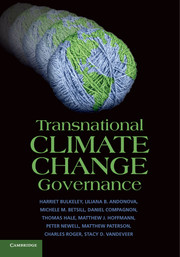Book contents
- Frontmatter
- Contents
- List of Figures and Tables
- Acknowledgements
- Acronyms and Abbreviations
- 1 Introducing Transnational Climate Change Governance
- 2 Mapping the World of Transnational Climate Change Governance
- 3 Theoretical Perspectives on Transnational Governance
- 4 Origins, Agency and the Forms of Transnational Climate Change Governance
- 5 Constructing Transnational Climate Change Governance Issues and Producing Governance Spaces
- 6 The Uneven Geography of Transnational Climate Change Governance
- 7 Understanding Authority and Legitimacy in Transnational Climate Change Governance
- 8 Making a Difference? Tracing the Effects and Effectiveness of Transnational Climate Change Governance
- 9 Conclusions – Looking Beyond Transnational Climate Change Governance
- References
- Index
2 - Mapping the World of Transnational Climate Change Governance
Published online by Cambridge University Press: 05 August 2014
- Frontmatter
- Contents
- List of Figures and Tables
- Acknowledgements
- Acronyms and Abbreviations
- 1 Introducing Transnational Climate Change Governance
- 2 Mapping the World of Transnational Climate Change Governance
- 3 Theoretical Perspectives on Transnational Governance
- 4 Origins, Agency and the Forms of Transnational Climate Change Governance
- 5 Constructing Transnational Climate Change Governance Issues and Producing Governance Spaces
- 6 The Uneven Geography of Transnational Climate Change Governance
- 7 Understanding Authority and Legitimacy in Transnational Climate Change Governance
- 8 Making a Difference? Tracing the Effects and Effectiveness of Transnational Climate Change Governance
- 9 Conclusions – Looking Beyond Transnational Climate Change Governance
- References
- Index
Summary
Introduction
Our knowledge of transnational governance has been fundamentally shaped by the theoretical perspectives and methodological approaches that have been used to study it (O’Neill et al. 2013, 444). Primarily using a case-study approach revolving around a few high-profile examples, research on transnational governance has focused on the ways in which actors have sought to engage with different forms of transnational governance, the various functions that such arrangements seek to perform and their potential consequences in terms of legitimacy and effectiveness. Such approaches have yielded significant insights into these aspects of transnational governance but cannot, by their very nature, achieve a more comprehensive or systematic view. As O’Neill et al. (2013) suggest, such approaches may be ill-equipped to deal with the challenges of ‘complexity and uncertainty, vertical linkages across multiple scales, horizontal linkages across issue areas, and (often rapidly) evolving problem sets and institutional initiatives’ that beset global environmental governance research, such that new methodological approaches are required. If we regard transnational governance initiatives as having something in common – in terms of what they are seeking to accomplish, or in terms of the ways in which they are organised and constituted – we suggest that methodological innovations capable of creating a more comprehensive account of the overall phenomenon are required.
In order to develop such a broader understanding of the extent and nature of transnational governance in the climate change domain, our approach extends beyond small n case-studies or surveys of one particular type of transnational arrangement through the construction and analysis of a database of sixty transnational climate governance initiatives. This approach enables an analysis of the contours of transnational climate governance in a way that has not been possible within existing methodological approaches, allowing for a more thorough description of who and what are involved, where it is taking place, and how and why it is being pursued.
- Type
- Chapter
- Information
- Transnational Climate Change Governance , pp. 17 - 37Publisher: Cambridge University PressPrint publication year: 2014



